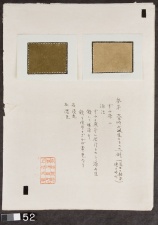Difference between revisions of "Zumi (Toringo Crab) - right (52 R)"
Jump to navigation
Jump to search
(username removed) |
m (MDerrick moved page Zumi - right (52 R) to Zumi (Toringo Crab) - right (52 R) without leaving a redirect) |
||
| (2 intermediate revisions by one other user not shown) | |||
| Line 5: | Line 5: | ||
| 52 | | 52 | ||
|- | |- | ||
| − | ! scope="row"| | + | ! scope="row"|Uemura number / title |
| − | | | + | | ; "Haze-some 25" |
|- | |- | ||
! scope="row"|Folder location | ! scope="row"|Folder location | ||
| Line 44: | Line 44: | ||
| ash water | | ash water | ||
|- | |- | ||
| − | ! scope="row"| | + | ! scope="row"|Uemura's notes |
| − | | One of the dyeing techniques, which had been used since the 8th century AD in Japan. " | + | | One of the dyeing techniques, which had been used since the 8th century AD in Japan. "". Without using iron mordant, the resultant color would be yellow. |
|- | |- | ||
| − | ! scope="row"| | + | ! scope="row"|Uemura's date |
| Kyoto Murasakino | | Kyoto Murasakino | ||
|} | |} | ||
| − | [[Category: | + | [[Category:Uemura dye archive]] |
Latest revision as of 21:11, 23 June 2020
| Museum number | 52 |
|---|---|
| Uemura number / title | ; "Haze-some 25" |
| Folder location | 1st shelf |
| Sample location | right (52 R) |
| Fiber type | silk |
| Color | light olive brown |
| Dyestuff (Japanese common name) | ずみ : Zumi |
| Dye (English common name) | Cherry Apple/Toringo Crab |
| Dyestuff (botanical name) | Malus toringo (Siebold) Siebold ex de Vriese |
| Plant part | unspecified |
| Dyestuff extraction | boiled in water |
| Auxiliary agent in dye bath | - |
| Mordant | iron |
| Other auxiliary agent | ash water |
| Uemura's notes | One of the dyeing techniques, which had been used since the 8th century AD in Japan. "". Without using iron mordant, the resultant color would be yellow. |
| Uemura's date | Kyoto Murasakino |
